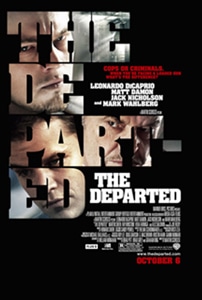
Hard-core gangster action, strong perfs from the younger leads, and gritty locations propel helmer Martin Scorsese’s return to the crime genre.
South Boston locals Billy Costigan (Leonardo Di Caprio) and Colin Sullivan (Matt Damon) are both new members of the Massachusetts State Police. As it happens, both also go undercover, but while Billy has entered Frank Costello’s (Jack Nicholson) mob crew, Colin is employed by Costello as a mole in an elite State Police unit.
Not only are they operating at cross purposes in their careers, they also share the affections of police shrink Madolyn (Vera Farmiga), with Colin getting the better of it. Colin seems better at dealing with the double life than Billy as well, taking full advantage of his natural charm, intelligence, and the back room help of Costello, who arranges for his rapid promotions.
Violence is used effectively, especially in the third act, when the whacking is fast and furious, and just when you think it’s over—it isn’t. Mark Wahlberg has an effective turn as a tough cop, who has a knack of coming around at the right times.
With the exception, though, of Martin Sheen as Billy’s superior on the force, the older players leave something to be desired. Nicholson had to be talked into accepting his part, and finally agreed because his last few efforts had been in comedy. The Costello role, he felt, was evil personified. Indeed, Scorsese lights him in red on at least one occasion to reinforce the Satan analogy, and also has him attacking clergy for no particular reason, other than to be contrary.
Costello is based, in part, on real-life Boston gangster and fugitive Whitey Bulger, who, despite his vile criminal record was actually a protected FBI informant. Given the over-the-top antics of Nicholson in this pic, it is easy to see how the “in part” provision applies, as Bulger’s cunning is matched not at all by Costello.
Nicholson’s cinematic bad guy, along with his brutal enforcer Mr. French (Ray Winstone), don’t quite fit the bill for modern crime lords, and a Nicholson scene in a porno theater is so ludicrous, one wonders how it made the final cut. Bulger is no doubt disappointed with this portrayal.
As to the suspend disbelief department, it defies all reason that both undercover officers would be text messaging on their cell phones under the very noses of their targets. And, for a psychiatrist, Madolyn seems about as perceptive as a spaced-out Valley girl.
In the annoyance department, you have the film’s length at 2½ hours, Scorsese’s third time in a row use of the Rolling Stones’ “Gimme Shelter,” following Goodfellas (1990) and Casino (1995), and multiple false endings. Several critics have commented that the film appears to have been made by a Scorsese imitator, rather than the old pro himself.
At the end of the day, “Departed” is a popcorn crime flick with many good points, but too uneven to be worthy of the mostly ultra-positive reviews extant. Still, compared to what’s current, it’s worth every penny of the admission price.